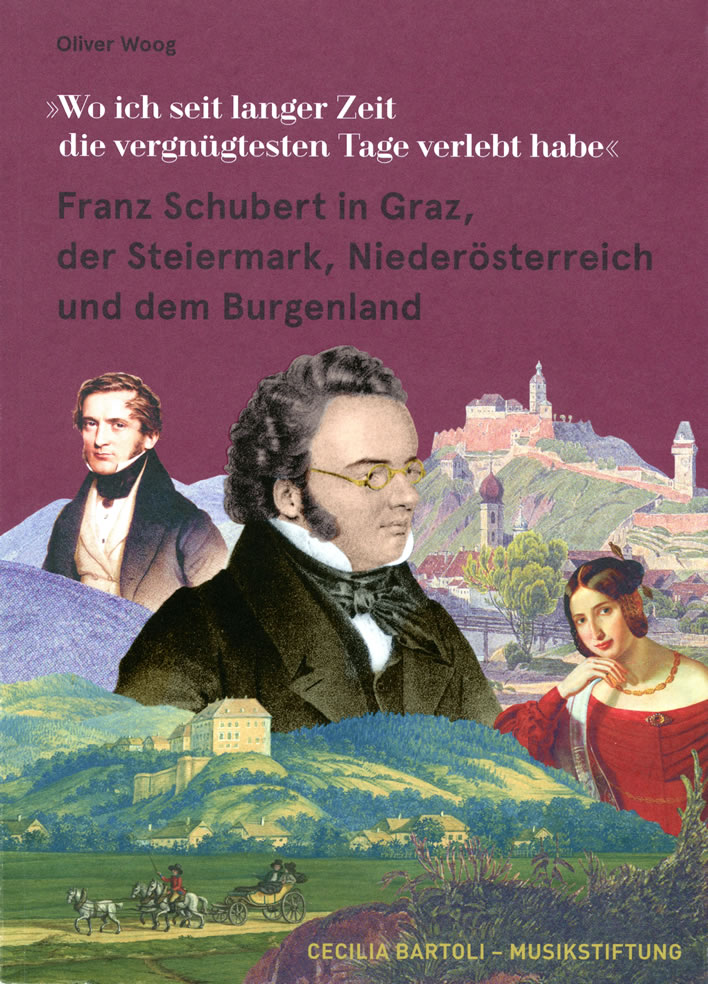Schubert on tour
Posted by Richard on UTC 2023-07-10 14:22
With every new volume in Oliver Woog's series of books on the Schubert Topographie we become ever more astonished at the investment of time and effort that has so obviously gone into them.

The cover of Oliver Woog's latest volume in his Schubert Topografie, »Wo ich seit langer Zeit die vergnügtesten Tage verlebt habe« Franz Schubert in Graz, der Steiermark, Niederösterreich und dem Burgenland. Schubert-Projekt-GbR, ISBN 978-3-9824191-3-8.
The present volume consists of two biographically separate sections, which take up equal halves of the book: Schubert's tour from Vienna to Graz and back in September 1827 and the shorter excursions in the vicinity of Vienna, in Lower Austria and Burgenland, which he undertook at various times in his adult life.
As far as the Graz tour is concerned, Woog wisely keeps to the essential facts of the matter. For example, any mention of the Hüttenbrenner brothers requires a standpoint to be taken on the 'true' nature of their relationship with Schubert and their roles in the characteristically Austrian shenanigans around the so-called 'unfinished' so-called 'symphony' – a debate which will itself never finish. Woog manages to acknowledge the Strudel of contradictions around this piece without himself getting caught up in it.
The Graz tour in 1827 took place just over a year before Schubert's untimely end (19 November 1828). Woog also avoids the trap, into which so many of the more emotional commentators fall, of suffusing that time with little Schwammerl's presentiment of his own death.
Schubert (and friend Schober) picked up a dose of syphilis in late 1822 or early 1823. Possibly the two reprobates had celebrated the coming of the New Year a little too enthusiastically, who knows? The rest of 1823 was extremely distressing for him, the treatment hardly better than the illness. After that dark year, Schubert was afflicted by various annoying medical problems, most noticeably migraines. Our guess is that these headaches had less to do with syphilis and more to do with Schubert's shortsightedness, rudimentary spectacles and long hours spent working on music scores by candlelight.
Understandably, given the context, he mentally bundled these into an hypochondriac, syphilis-based narrative which seems to have haunted him until his death – from typhoid fever, an ailment quite unconnected with that narrative.
Schubert may have gone through the later years of his life imagining himself a doomed man, but he had as little idea of the date of his death as any human being normally has.
The journey to Graz and his stay with the Pachlers seem to have made September 1827 one of the happier months of his life. He certainly needed the respite, since up until then that year had been emotionally very tough for him (it was the year of Winterreise, remember). Depression and hypochondria seem to have kicked in once more from the moment he returned to Vienna.
The second major section of the book, dealing with trips to places in the vicinity of Vienna is also a welcome and well-researched contribution to Schubert studies. Woog provides concise backgrounders on two of the people associated with these journeys: the iridescent figure of Franz von Schober and that of fellow composer Franz Lachner.
All Schubert scholars will be grateful to Woog for putting the hard facts of the Schubert topography at their disposal. Here is the labour of many years, researching all the places in Austria in which the nomad Franz Schubert in his short adult life had set foot or rested his head (in reality or only according to legend), many hours of travelling, collecting images of places, people, artefacts and documents of all types, heaping up quotations and citations. Years of dedicated application which have put faces and places where before we only had footnotes.
The series belongs on the bookshelves of anyone who is interested in the Schubert biography. That biography is not just the record of a musical genius but also an insight into the now distant world in which he lived and worked. Woog's Topographie brings to our attention in word and picture the wider social context of the composer's life.
The book is available directly online, or via the usual suspects.
0 Comments UTC Loaded:
Input rules for comments: No HTML, no images. Comments can be nested to a depth of eight. Surround a long quotation with curly braces: {blockquote}. Well-formed URLs will be rendered as links automatically. Do not click on links unless you are confident that they are safe. You have been warned!